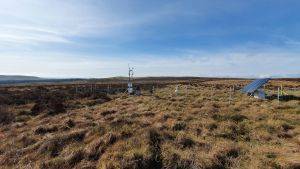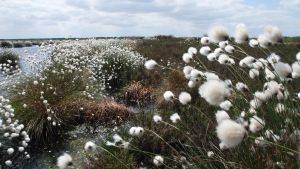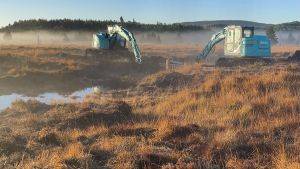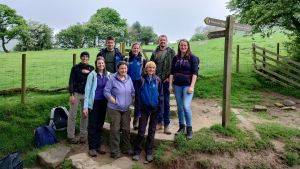Peatland Code projects are hosted on the UK Land Carbon Registry alongside Woodland Carbon Code projects.
The UK Land Carbon Registry is the Peatland Code’s electronic database that stores and publicly displays data about the status of Projects and ownership and use of Carbon Units. Managed by IHS Markit now a part of S&P Global, it records transactions and provides a public and transparent picture of UK-based Carbon Units. All Peatland Code Projects and Carbon Units must be recorded on the Peatland Code Registry.
For Information on registry rules of use please see the Woodland Carbon Code website.
Registry fees
|
Fee type |
Fee payable by |
Payable |
Fees until 31st October 2024 |
Fees from 1st November 2024 |
|
Account Opening - Project Developers/Proponents |
N/A |
N/A |
Free |
Free |
|
Account Opening - Corporate End Users |
Corporate End User Account Holder |
Prior to account opening |
£400 businesses/ £200 NGOs |
£400 businesses £200 non-governmental organisations |
|
Account Opening - Traders or Retail Aggregators |
Trader or Retail Aggregator Account Holder |
Prior to account opening |
£750 |
£750 |
|
Annual Account Management - Traders or Retail Aggregators |
Trader or Retail Aggregator Account Holder |
Annually on the anniversary of account opening |
£750 |
£750 |
|
Pending Issuance Unit issuance |
Project developer |
At validation |
£0.10 per unit
(of which £0.05 per unit funds Scottish Forestry/IUCN UK Peatland Programme to support the standards) |
£0.15 per unit
(of which £0.10 per unit funds Scottish Forestry/IUCN UK Peatland Programme to support the standards) |
|
PIU to PCU Conversion |
Project developer |
At each verification |
Minimum fee £100, plus £0.05/unit above 2,000 units |
Minimum £100, plus £0.10 per unit for higher volumes** (of which £50 and £0.05 per unit funds Scottish Forestry/IUCN UK Peatland Programme to support the standards) |
| Peatland Carbon Unit issuance (new Peatland Carbon Units issued at verification, without prior Pending Issuance Unit issuance) | Project Developer | At each verification |
Minimum fee £100, plus £0.10 per unit for higher volumes** (of which £0.05 per unit funds Scottish Forestry/IUCN UK Peatland Programme to support the standards). |
Minimum £100, plus £0.15 per unit for higher volumes** (of which £50 and £0.10 per unit funds Scottish Forestry/IUCN UK Peatland Programme to support the standards). |
|
Reinstating Units Assigned or Retired in Error (reported within 72 hours of assignment/retirement, with evidence to confirm the error) |
Account holder who instigated the assignment or retirement |
As required |
£90 for up to 10 blocks of credits |
£90 for up to 10 blocks of credits |
** Note: At verification there is always a minimum fee of £100 payable. If the combined cost of Pending Issuance Unit conversion and/or additional Peatland Carbon Unit issuance exceeds £100, the charge is based on the actual unit issuance and conversion fees.
For example, if the total cost of conversion and issuance is £80, you will be charged £100. If the total cost of conversion and issuance is £120 you will be charged £120.
Accounts on the UK Land Carbon Registry
There are five types of accounts. All accounts are public on the UK Land Carbon Registry:
- Project Developer accounts for organisations/individuals that own or manage projects, issue Pending Issuance Units or Woodland/Peatland Carbon Units and transfer units to corporate end users, retail aggregators or traders or assign/retire them on behalf of their clients
- Project Proponent accounts for organisations/ individuals that own projects but do not manage their own project or issue the Pending Issuance Units or Woodland/Peatland Carbon Units in the registry. A project developer can transfer units to the project proponents of the projects they have listed, or a project’s units can be directly listed in the project proponent’s account. Project proponents can transfer units to corporate end users, retail aggregators or traders or assign/retire them on behalf of buyers.
- Buyer accounts for organisations which buy carbon credits from Woodland Carbon Code/Peatland Code projects for their own use or for their clients; this includes:
- Corporate End User accounts for those who are ‘buying to use’ and can receive Pending Issuance Units (to use/retire once verified) or Woodland/Peatland Carbon Units (which can be used/retired immediately). It is not possible to sell on any unused units.
- Trading accounts for those who are ‘buying to sell on’ and can receive Pending Issuance Units or Woodland/Peatland Carbon Units and assign/retire them on behalf of their clients or transfer them upon sale to other market participants. However, trading account holders must be registered and authorised by the Financial Conduct Authority to carry out a regulated activity under the Financial Services and Markets Act 2000 or appropriate, equivalent local regulatory authority. See the Financial Services Register.
- For companies not registered and authorised by the Financial Conduct Authority, a Retail Aggregator account gives limited functionality. Retail aggregators who are buying on behalf of their corporate end user clients can receive Pending Issuance Units or Woodland//Peatland Carbon Units from a project developer or project proponent and assign or retire them immediately on behalf of their ‘end user’ clients. Assigned units can be transferred into the account of ‘end user’ clients as appropriate.
- Individuals cannot hold a buyer account. An individual can only buy verified Woodland/Peatland Carbon Units to retire immediately – they could buy direct from the project developer or from someone with a retail aggregator/ trading account, who can ‘retire’ the units on their behalf making clear the reason (e.g. ‘Retired in 2020 on behalf of Mr Smith to compensate for his March 2019 household emissions’).










